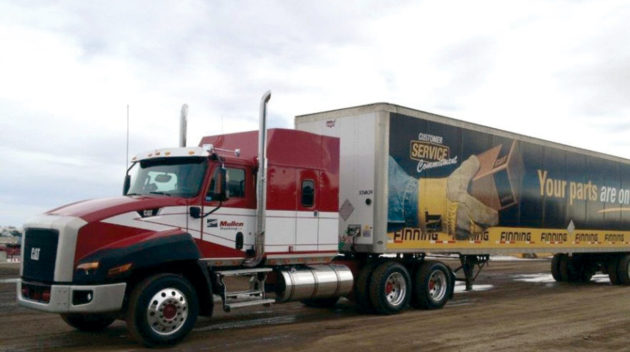Impact of Covid-19 varies carrier to carrier
OKOTOKS, Alta. – The impact of the Covid-19 crisis can be felt across Western Canada, and though many outside the industry see trucking as a booming business right now, the societal lockdown has affected carriers in different ways.
Mullen Group, for example, which operates Mullen Trucking out of Okotoks, Alta., has had to implement a series of “bold actions” in response to what it called unprecedented declines in economic activity due to the spread of the coronavirus.
“We all have a responsibility to help those in our communities who are most vulnerable to this virus, and of course the health care providers who will be asked to sacrifice immensely in the days that lie ahead,” said Murray Mullen, chairman and CEO of Mullen Group.
In addition to the company’s already implemented safety protocols for its workers and customers, Mullen announced several new initiatives in its Covid-19 action plan to weather the economic storm.
Senior executives and directors at the company will see a reduction in their rate of pay for the next 90 days, and the suspension of some services will result in temporary layoffs due to work shortages.
Mullen said the company has established an Employee Financial Assistance Fund of up to $5 million to be made available to eligible employees.
“Mullen Group is extremely well-positioned to weather this extraordinary situation,” said Mullen. “As of today, we have over $90 million in cash on the balance sheet, ample liquidity available in the form of an undrawn line of credit, and a diversified business model.
“Our first priority must be to look after those employees, and their families, who will be temporarily laid off, which is why today I am announcing that the Mullen Group will be offering assistance to our employee workforce impacted through no fault of their own. Up to $5 million will be made available to support employees and their families. There is no better investment we can make than in our employees.”
Despite the downturn amid the Covid-19 response, Mullen said his business’ diversity has enabled it to remain robust, particularly its less-than-truckload segment.
“A large portion of our overall business will continue to be required to meet the daily needs of Canadians, a reality reflected by the Canadian government’s decision designating truck drivers as an essential service,” said Mullen. “So, we will have business, but clearly, as many industries temporarily close, the demand for trucking and logistics service will be impacted.”
Additional action the Mullen Group is taking during this crisis include the temporary suspension of monthly dividend for three months, the ongoing evaluation of acquisitions, and the continued share buy-back program.

Further west in B.C., Hawkeye Holdings, which transports food products throughout Western Canada, has seen a surge in demand for food and alcohol shipments.
Jordan Wilson, logistics manager for Hawkeye, said though there has been an increase in demand, the carrier’s operations, for the most part, has remained normal.
“There has been no change in our schedules. All our customers as well as ourselves have put procedures in place to deal with sanitization and social distancing practices,” said Wilson. “Nothing has really changed on demand, but I do see a crunch coming once people start running out of money due to them being off work. It is going to be a very trying year for sure.”
Drivers for Hawkeye are busy but they are not driving at night, as rest is top priority for the carrier.
The only change in the company’s operations is the new loading and unloading procedures to ensure driver and customer safety. Everything else is business as usual for Hawkeye, Wilson said, at least for now.
Thomas Payne, president of Payne Transportation out of Winnipeg, Man., said owner-operators who haul cross-border for the company have seen smooth processes in place at the border, which closed to all non-essential travel this past Friday.
“I was relieved to hear our Prime Minister and the President of the U.S. both say all cross-border trucking is ‘essential,’ and I believe it is for the economy,” said Payne. “What I’m not sure of at this time is the level of demand for services as the economy slows and to what extreme. There’s pricing pressure and then there’s panic pricing.”
The challenge Payne sees moving forward is how carriers will continue to operate effectively all while doing their best to limit the risk of spreading the Covid-19 virus.
“We have over half our staff now at home operating very proficiently,” said Payne. “We all have contingency plans in case of emergency, and now is as good a time as any to implement them and test their effectiveness.”
Have your say
This is a moderated forum. Comments will no longer be published unless they are accompanied by a first and last name and a verifiable email address. (Today's Trucking will not publish or share the email address.) Profane language and content deemed to be libelous, racist, or threatening in nature will not be published under any circumstances.
While it appears (most) everyone is trying to do their part, support for those which must continue providing services is dwindling; truck drivers could well be the unsung heroes of our country in the the days, weeks and months to follow yet, something as simple as getting a cup of coffee or a bowl of soup is proving to be more difficult each day. Washing our hands – what everyone knows to do, but find a washroom that isn’t closed.
Please don’t forget these people when developing your safety strategies – they need your support in order that they stay safe as well.
sad!